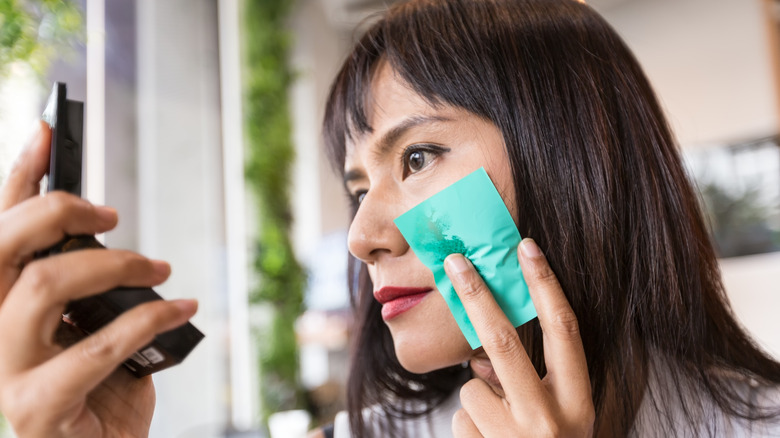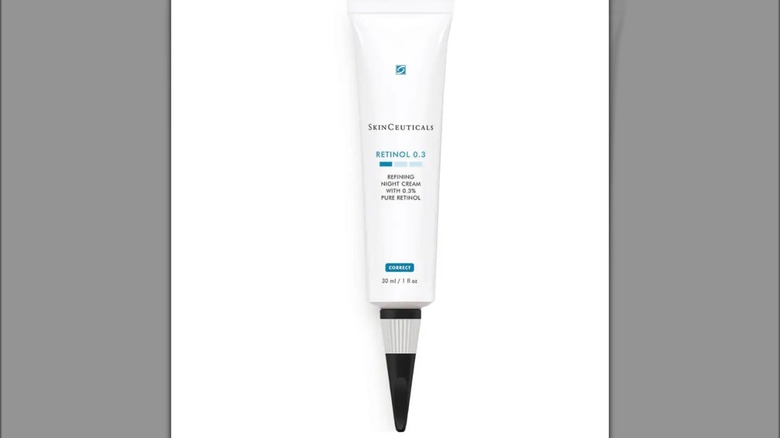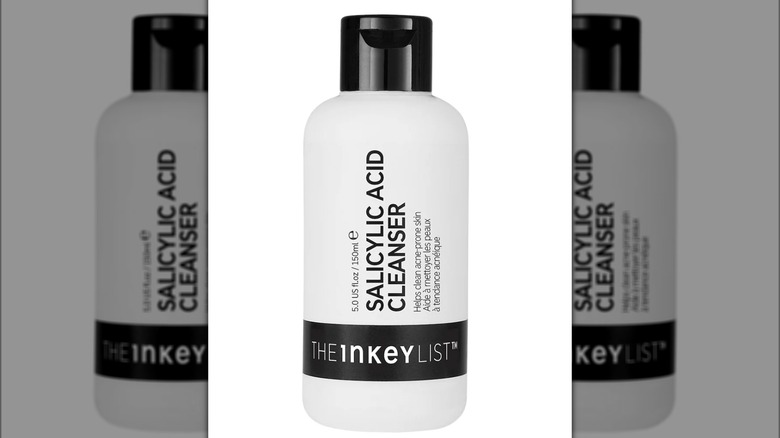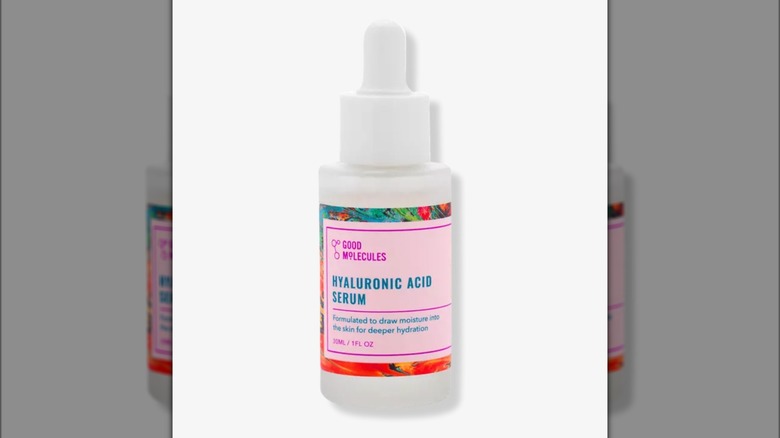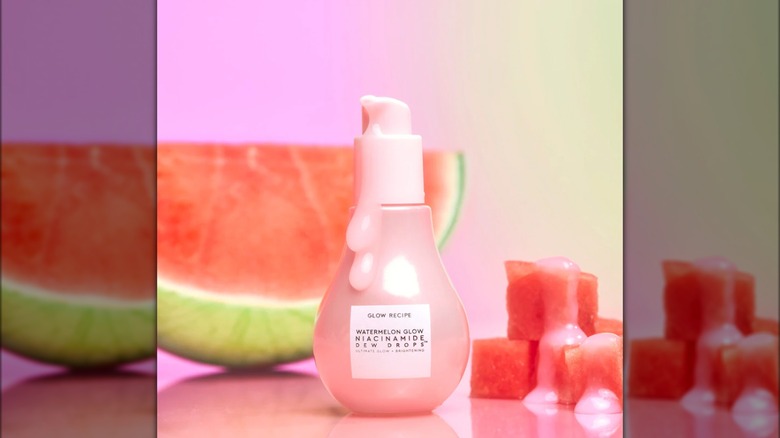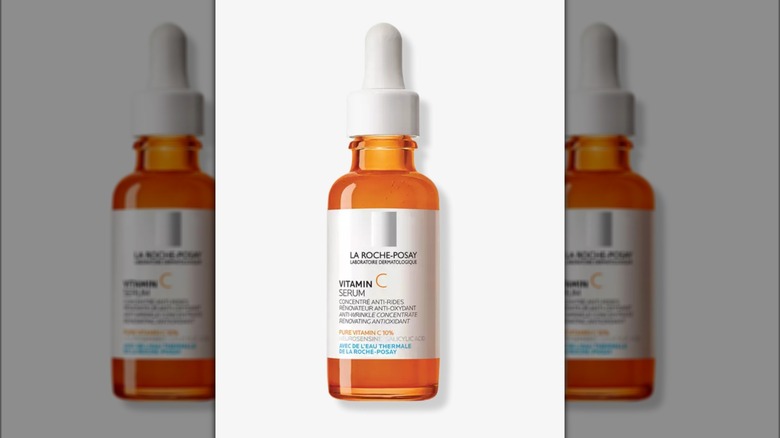The Top 5 Must-Have Skincare Ingredients For Oily Skin
We may receive a commission on purchases made from links.
Oily skin can be both a blessing and a curse. On the one hand, according to the American Academy of Dermatology, oily skin is thicker than dry skin, which means it takes longer to wrinkle. At the same time, an oily complexion can be difficult to manage, especially if you like wearing makeup. More often than not, especially during summer months, your face looks shiny, or in the worst cases, greasy, after simply stepping outside for a few minutes.
If this is your skin type, chances are you were told in your youth that your skincare should focus on mattifying products, like peroxide and alcohol to keep oil at bay. However, it's important to note that oil management is only one component of the equation. As Dr. Imahiyerobo-Ip explains in SELF, a harsh, drying regiment like this can actually make matters worse by triggering more oil production. Instead, caring for oily skin can and should be as gentle a process as it is for dry skin. This means the trick is to not get rid of moisture, but rather, to find the right balance of it. So while you'll want to avoid viral trends like skin slugging, hydration is absolutely mandatory.
With this gentle care in mind, we've sourced several ingredients that are crucial for healthy, oily skin. We've chosen from dermatologist-approved products that will not only help lessen oil production, but also mitigate breakouts — an all too common annoyance for those of us blessed with glistening faces. Not to worry, there's an abundance of beneficial ingredients that take good care of oily skin.
Retinol clears pores and curbs oil production
Retinol, or vitamin A, is great for all skin types, but it's exceptionally good for those with oily complexions. "I'm a huge proponent of retinoids for general skin health, but they can also decrease oil production because they shrink the sebaceous glands," board-certified dermatologist Dr. Sapna Westley, MD, told Everyday Health. Since retinol accelerates cell turnover, it helps skin slough away dead skin cells, which in turn, keeps skin looking radiant rather than greasy. The fact that retinol assists with collagen production, which keeps skin smooth and wrinkle-free, is just the cherry on this skincare sundae.
The fat-soluble vitamin is a wonder if one also struggles with acne, a not-uncommon situation for those with oily skin. "In acne-prone skin, cell-turnover can help unclog pores since a lot of what's clogging pores is that old, dead skin, and if you make that happen faster it will unclog those pores," board-certified dermatologist Jason Miller, MD explained to Well + Good. So if you're looking for something to add to your skincare routine, retinol is an action-oriented product. Source something like SkinCeuticals Retinol 0.3, for $78, or Paula's Choice 1% Retinol Treatment for $64. It's best to use retinol at night, and be sure to wear an SPF in the daytime.
Salicylic acid works great for oily skin in cleansers, toners, and moisturizers
Salicylic acid is a winner when it comes to caring for oily skin. It's an exfoliant, and works wonders at eliminating dead skin cells, as well as targeting acne and blackheads. "It works by increasing the amount of moisture in the skin and dissolving the substance that causes the skin cells to stick together. This makes it easier to shed the skin cells," dermatologist Ellen Marmur, MD, told Byrdie. Salicylic acid is a BHA (beta-hydroxy acid) exfoliant, so it's oil-soluble, unlike it's counterpart, AHA, making it a better option for oily skin because of its ability to deeply penetrate the skin. It's also anti-inflammatory, so it's effective at soothing acne and redness.
While you can get salicylic acid in several different skin care products, dermatologist Dr. Sapna Westley, MD, told Everyday Health that it's best to pick one product with the acid and stick to that. You don't want to overdo it. For example, pick a face wash with salicylic acid, but don't add a toner with the ingredient as well. Something like The Inkey List's Salicylic Acid Acne + Blackhead Cleanser for $11.99 from Sephora is a great choice. Start out slowly, introducing the acid a few times a week. "If you dry your skin out too much, you can end up with rebound oiliness," Dr. Westley explained. Like retinol, use an SPF in the daytime to protect your skin. Salicylic acid means business, and our skin needs that added defense.
Hyaluronic acid helps to moisturize oily skin
Just because your skin is oily doesn't mean it can go without hydration. "Those with oily skin can still have dehydrated skin, which means it can have high sebum levels, but low water content," dermatologist Claire Chang, MD told Allure on "The Science of Beauty" podcast. Occlusives, which create a barrier over the skin, can clog oily skin and create breakouts. Humectants, which attract and bind water, are a much more successful moisturizer for those already high in sebum production.
This is where hyaluronic acid comes in as the thirst quencher for oily skin. "Hyaluronic acid is a less occlusive form of moisture," board-certified dermatologist Sapna Westley, MD told Everyday Health. You can source it as a solo serum or as an ingredient in oil-free moisturizers. The acid is a fan-favorite for good reason. According to Harvard Health, hyaluronic acid can bind together over a thousand times its weight in water, so skin feels plumper and significantly more hydrated. Best of all, this solutions-oriented ingredient is very affordable. A bottle of hyaluronic acid serum by Good Molecules costs $6 from Ulta Beauty, so you don't have to spend a lot to keep oily skin happy.
Niacinamide soothes oily skin
Niacinamide, which is essentially vitamin B3, is another lifesaver for oily skin. Rather than harshly stripping oily skin, niacinamide gently soothes skin, while reducing sebum production. In a clinical trial published by the National Library of Medicine, researchers found that those who applied 2% niacinamide saw a significant reduction in sebum production after six weeks of use.
"Clinical studies have shown that niacinamide can improve excess sebum production (overly oily skin), the appearance of pores, fine lines and keep the skin's barrier intact," Dr. Ewoma Ukeleghe told Refinery29. It works best when it can interact with your skin for longer periods of time, which is why it's more commonly sold in serum format rather than something like a face wash. If your nighttime routine is already packed with products like retinol, niacinamide is a great choice as part of your morning ritual. Apply after cleansing and toning, apply a niacinamide serum and follow with a light moisturizer. A great choice is The Ordinary's Niacinamide 10% + Zinc 1%, which costs $6. Glow Recipe also has an option with their Watermelon Glow Niacinamide Dew Drops Serum from Sephora for $35. So there are plenty of options, depending on price point.
Vitamin C is packed with antioxidants that nourish oily skin
Vitamin C is another essential ingredient for oily skin — and every skin type, frankly — thanks to its rich supply of antioxidants and anti-inflammatory capabilities. "They work to stimulate collagen, lighten dark spots, and protect against sun damage," dermatologist Diane Madfes, MD, told Byrdie of vitamin C serums. "They're also great for fine lines, melasma, and rosacea." Vitamin C is a powerful ingredient, and even though oily skin is tougher than dry skin, proceed with caution. Start by using it a few times a week, then work your way up daily use in the mornings; too much too soon can lead to irritation and itchiness.
For oily skin, look for a serum that has L-ascorbic acid, and choose an appropriate percentage. "Identifying the right concentration for your skin type is essential to how effective your topical vitamin C will be," dermatologist Dr. Patricia Wexler told Vogue. "Begin with a low concentration of 10% and increase to 15% or 20% as tolerated." Dr. Wexler recommended. New York Magazine interviewed dermatologists about the best vitamin C serums for different skin types, and Dr. Julie Russak, founder of the Russak Dermatology Group, chose Skinceuticals Phloretin CF as the gold standard for oily skin. The serum, which contains 15% L-ascorbic acid, was also good at targeting "increased pigment production, which usually occurs due to UV exposure," Russak noted. It's $182 a bottle, so it's not cheap. La Roche-Posay's 10% Pure Vitamin C Anti-Aging Face Serum at $46.99 is both affordable and effective.
